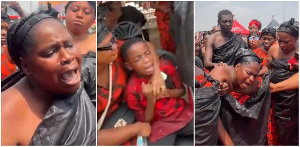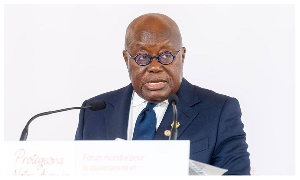The Supreme Court of Liberia has upheld the lower court’s ruling against Senator-elect J. Brownie Samukai and two other co-appellants and sentenced them to two years in prison each for misapplication of US$1.1 million intended for the Armed Forces of Liberia.
However, the court ruled that the prison terms could be suspended if the convicts restitute 50 percent of the fund within six months and make full payment within a year.
The ruling of the nation’s highest court against Mr. Samukai, the newly elected Senator of Lofa County is a huge blow to his re-emerging political career and the opposition Collaborating Political Parties (CPP) on whose tickets he got elected.
Mr. Samukai, the former Minister of Defense had hoped to have been exonerated by the High Court following his conviction by the lower court in 2020.
Judge Yamie Quiqui Gbeisay of Criminal Court ‘C’ in March 2020 ruled him and two of his co-defendants, Joseph P. Johnson, former Deputy Minister for Administration and James Nyumah Dorkor, former Comptroller of the Ministry of Defense guilty of the crimes of theft of property, misuse of public money and criminal conspiracy and awarded them separate prison terms.
Mr. Samukai was given a higher two-year prison sentence, while his co-defendants were given six months jail terms each but with a condition that their sentences shall be suspended if they all restitute the amount of US$1.1 million in question over a one-year period.
A summary of the prosecution, in this case the Government of Liberia’s argument is that defendant Samukai and his co-defendants had no authority to use the AFL pension funds; that in fact said funds were private funds; and that the defendants issued checks in their own names for personal benefits.
But the Defendants took appeal at the Supreme Court and they (serving now as appellants), justified that they acted in line with the Constitution and relevant laws.
They claimed that they acted on the orders of former President Ellen Johnson Sirleaf to procure materials and render other services for the soldiers.
They claimed that US$50,000 was paid on the instruction of former President Sirleaf as death benefits to the families of the late General Abdurrahman, the Nigerian army officials who served as the first post war first Chief of Staff of the Armed Forces of Liberia.
They argued that President George Weah was also briefed about the expenditure of the fund and an agreement was reached between him and Sirleaf for the Government to repay the AFL fund, adding that it was based on this commitment that President Weah ordered an initial payment of US$460,000.
But reading the four to one opinion of the High Court, Associate Justice Yousif D. Kabah said the court did not find substantive evidence that Mr. Samukai and his co-appellants were authorized by the former President. But assuming they were given authorization, they should have declined because the action was against the law.
The Supreme Court also claimed that there is unrefuted evidence gathered from the records of the case that the soldiers of the AFL compulsorily contributed to the fund lodged in the AFL Pension Account established at Ecobank Liberia Limited, and as such the said account is not a public account intended for the operational use of the Ministry of National Defense.
Excerpt of the Court’s opinion: “That the evidence culled from the records shows that the appellants were fiduciaries of the soldiers of the AFL Pension Account; hence, every withdrawal from said account should have been by authorization or consent of the soldiers of the AFL.
"Therefore, the unrelated expenses of US$1,147,656.35 on the instruction of the former President of Liberia was without the pale of the law, and the appellants are held personally liable for the unauthorized expenditure on the accounts.”
The high court upheld the lower court’s decision with a slight modification that they all should be awarded a two-year prison sentence each since they committed the crimes together.
Africa News of Tuesday, 9 February 2021
Source: frontpageafricaonline.com

















